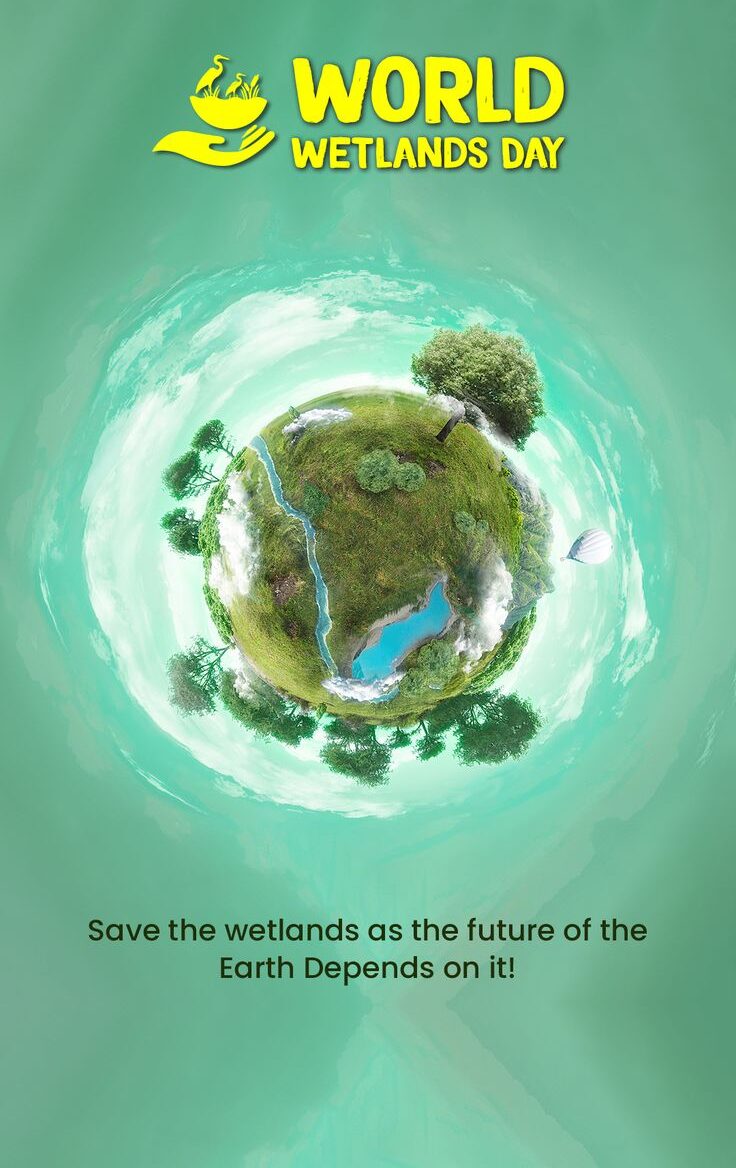6 Powerful Reasons Why World Wetlands Day is Crucial for Our Planet
World Wetlands Day, observed every year on February 2, celebrates the significance of wetlands and raises awareness about their vital role in maintaining ecological balance. Wetlands are areas where water covers the land, such as marshes, swamps, bogs, and floodplains. They are rich ecosystems that provide numerous environmental, economic, and social benefits. This day is a reminder of the urgent need to conserve these precious areas to ensure a sustainable future for our planet.
What is World Wetlands Day?
World Wetlands Day was established in 1997 to commemorate the adoption of the Ramsar Convention on February 2, 1971. The Ramsar Convention is an international treaty aimed at the conservation and sustainable use of wetlands. World Wetlands Day serves as an opportunity to raise global awareness about the importance of wetlands and the urgent need for their preservation. Each year, the day is celebrated with various events that highlight wetlands’ role in combating climate change, supporting biodiversity, and providing vital ecosystem services.
History of World Wetlands Day
- 1971: The Ramsar Convention was adopted in Ramsar, Iran, aiming to protect wetlands around the world. The convention marked a significant step toward global conservation efforts.
- 1997: World Wetlands Day was established to coincide with the anniversary of the Ramsar Convention. This day became an opportunity to reflect on the achievements of wetlands conservation and the challenges still faced.
- Annual Themes: Each year, the celebration of World Wetlands Day is centered around a specific theme, such as the importance of wetlands for water purification, biodiversity, or climate change mitigation. The theme varies, but the core message remains focused on the urgent need to protect these valuable ecosystems.
Daily Life Impacts of Wetlands
Wetlands are essential to the environment and play a significant role in daily life. Here’s how wetlands impact our day-to-day activities:
- Water Regulation: Wetlands help regulate water systems by absorbing excess water during floods and slowly releasing it during droughts. They act as natural water storage systems, preventing floods and droughts that could disrupt daily life.
- Carbon Sequestration: Wetlands absorb and store carbon from the atmosphere, helping to combat climate change. By keeping greenhouse gases out of the atmosphere, they contribute to reducing global warming.
- Biodiversity Support: Wetlands are home to numerous plant and animal species. They provide habitats for diverse wildlife, contributing to the global effort to maintain biodiversity. Wetlands help maintain the balance of ecosystems that humans depend on for food, water, and other resources.
- Agriculture and Livelihoods: Wetlands provide essential resources such as fish, water plants, and fertile soil. Many communities rely on wetlands for agriculture, fishing, and other livelihoods, contributing to economic sustainability.
- Tourism and Recreation: Wetlands support ecotourism, offering recreational opportunities such as birdwatching, boating, and hiking. These activities bring economic benefits to local communities and provide people with a closer connection to nature.
How is World Wetlands Day Observed?
World Wetlands Day is observed in a variety of ways across the globe, with activities aimed at promoting wetlands conservation and educating the public on their importance:
- Educational Programs: Schools, universities, and community organizations host events such as lectures, workshops, and exhibitions to inform people about the value of wetlands.
- Wetland Restoration Projects: On this day, local environmental groups and conservation organizations often organize wetland restoration initiatives to rehabilitate damaged ecosystems.
- Media Campaigns: Governments and NGOs use television, radio, and social media platforms to raise awareness about wetlands, their benefits, and the threats they face.
- Clean-up Events: Community groups frequently organize wetland clean-up activities to remove waste and prevent pollution from harming these vital ecosystems.
- Government and NGO Collaboration: World Wetlands Day often sees collaboration between governments, international organizations, and non-profits to take action and highlight policies for wetland conservation.
6 Key Facts About Wetlands and Their Importance
- Vital for Biodiversity: Wetlands are among the most biologically diverse ecosystems on Earth, supporting an estimated 40% of the world’s species. Many migratory birds, amphibians, and fish depend on wetlands for breeding and feeding.
- Wetlands and Climate Change: Wetlands are carbon sinks, meaning they absorb more carbon than they emit. They play a key role in mitigating climate change by trapping carbon dioxide and preventing it from entering the atmosphere.
- Source of Freshwater: Wetlands are crucial for the filtration and purification of water. They act as natural water treatment plants, improving water quality by removing pollutants and sediments before water reaches rivers and lakes.
- Flood Control: Wetlands absorb and store excess rainwater, reducing the risk of flooding. They act as sponges, releasing water slowly over time and protecting downstream areas from flood damage.
- Threats to Wetlands: Despite their importance, wetlands are disappearing at an alarming rate due to urbanization, agricultural expansion, pollution, and climate change. It is estimated that we have lost about 50% of the world’s wetlands since the 1900s.
- Economic Benefits: Wetlands provide direct and indirect economic benefits, such as supporting fishing industries, agriculture, water purification, and tourism. It’s estimated that wetlands contribute over $47 trillion to the global economy annually.
FAQs About World Wetlands Day
Q1: Why is World Wetlands Day important?
A: World Wetlands Day is important because it raises global awareness about the environmental, economic, and social benefits of wetlands. It calls for collective action to conserve and restore these critical ecosystems that are essential to our survival.
Q2: How can I contribute to wetland conservation?
A: You can contribute by supporting wetlands conservation organizations, participating in local wetland restoration projects, reducing water pollution, and advocating for better protection and management policies.
Q3: What are the main threats to wetlands?
A: The main threats to wetlands include urban development, agricultural expansion, pollution, climate change, and unsustainable resource extraction.
Significance of World Wetlands Day
- Environmental Awareness: World Wetlands Day helps raise awareness about the critical role wetlands play in sustaining healthy ecosystems. It educates the public about the importance of conserving these habitats and encourages action to protect them.
- Climate Change Mitigation: Wetlands are natural carbon sinks that help mitigate the impacts of climate change. By preserving wetlands, we can reduce greenhouse gas emissions and combat global warming.
- Biodiversity Preservation: Wetlands provide a unique habitat for a wide variety of plant and animal species. Celebrating World Wetlands Day encourages the preservation of biodiversity and the protection of species that rely on wetland ecosystems.
- Promotes Action: World Wetlands Day serves as a call to action for governments, organizations, and individuals to work together in preserving wetlands and addressing the threats they face.
Wishing and Spreading the Word on World Wetlands Day
- “Happy World Wetlands Day! Let’s work together to protect our wetlands and secure a sustainable future for generations to come.”
- “On World Wetlands Day, we celebrate the beauty and importance of wetlands in maintaining our planet’s health. Join the movement for conservation!”
- “Every wetland matters! Let’s stand together to ensure that these vital ecosystems are protected for future generations.”
Conclusion
World Wetlands Day is a reminder of the incredible importance of wetlands in our world. From providing clean water to mitigating climate change and supporting biodiversity, wetlands are crucial to the health of our planet. By celebrating this day and taking action to conserve and protect wetlands, we contribute to a sustainable future where these vital ecosystems can continue to thrive.











Here, you can discover a wide selection of slot machines from top providers.
Users can enjoy traditional machines as well as new-generation slots with high-quality visuals and bonus rounds.
Even if you’re new or a casino enthusiast, there’s something for everyone.
money casino
The games are ready to play anytime and designed for desktop computers and smartphones alike.
All games run in your browser, so you can get started without hassle.
Site navigation is user-friendly, making it quick to explore new games.
Join the fun, and enjoy the world of online slots!